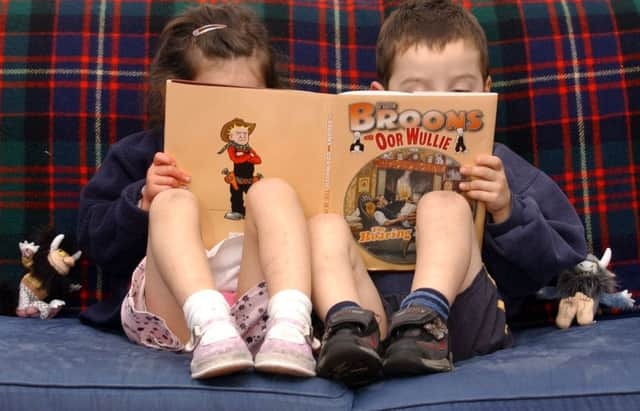Early language skills vital for poorer children


While being able to read well is critical for children’s prospects at school and later in life, one in five youngsters who are growing up in poverty are unable to read well by the time they finish primary school.
The research, from the Read On, Get On campaign, said this “helps explain the persistent educational divide in Scotland that each year prevents thousands of our poorest children from fulfilling their potential”.
Advertisement
Hide AdAdvertisement
Hide AdThe campaign group, a coalition of charities including Save the Children and literary agencies, is now calling on the Scottish Government to invest in early-years education to ensure all nurseries have at least one member of staff who has a graduate level qualification in early language or literacy.
A child who has an above-average vocabulary at the age of five and who has not been in poverty will do better throughout primary school than a similar-age child who has below average vocabulary skills and has suffered from persistent poverty.
Children from a better-off background and with greater vocabulary skills will score on average 36 per centmore in reading tests at the age of seven and will also be an average of 22 per centahead in comprehension tests when they are 11.
The report said: “Learning to read well starts early and good early language skills are the vital stepping stone.
“If children do not learn to speak and listen from an early age, along with developing their understanding of the meaning of words and stories, they will struggle to learn to read well when they get to primary school
“The Read On, Get On campaign has therefore set an interim goal that every child in Scotland has good language skills by the time they start school.
“Boosting children’s early language skills is therefore critical to narrow the attainment gap and improve the life chances of our poorest children.”
By the age of five most children should be able to speak in full sentences and use most of the everyday words that adults use, according the group.
Advertisement
Hide AdAdvertisement
Hide AdAt this stage, youngsters should also be asking lots of ‘why?’ questions as they try to understand the world around them, and should be able to talk confidently about the past and the future.
“However, in Scotland there remains a stubborn gap in language skills between poorer children and their peers,” the report said.
“Children from the most deprived areas are twice as likely to experience difficulties in language development before they start school.
“At age three, a third of children identified as having a speech, language or communication concern are from the most deprived areas.”
It added it is “vital that, as a country, we do more to ensure that the vast majority of children develop strong language skills by the age of five”.
Read On, Get On wants to see more focus on developing early language skills in childcare inspections, adding that staff should also be trained to support parents help their children with the basics of language and identify those who might need extra help
Professor Sue Ellis, chair of the Read On, Get On Campaign, said: “We want all young children to have strong language skills by the time they start school - it is the biggest educational issue that Scotland’s young children face in terms of development.
“Being behind in language will affect children’s learning, their social skills and their life chances.
Advertisement
Hide AdAdvertisement
Hide Ad“Early language is the vital stepping stone to literacy and there is very clear evidence that poverty and deprivation continue to impact on children’s ability to read well. Illiteracy impacts on all areas of a child’s life.”
Opposition politicians at Holyrood said the report was a call to act for the Scottish Government.
Liz Smith, the Conservative spokeswoman for young people, said: “All the research tells us that the pre-school years are the most important when it comes to giving a child the best start in life and exactly the same is true for literacy skills.
“Far too often in Scotland, young children arrive at school already some way behind their peers when it comes to reading and language skills, so it is very obvious that they will encounter difficulties as they progress through primary school.
“Literacy is the greatest gift we can give any child, not only because of the educational benefits but because of the social ones too.
“Children who can engage well with their parents and teachers when they are reading develop much greater confidence and self-esteem, and it gives them a head start when it comes to other learning.
“This report is important and yet another reminder to the Scottish Government of the urgency required to tackle this serious problem.”
Liberal Democrat education spokesman Liam McArthur said: “This report underlines the urgent need for the Scottish Government to expand free childcare for two-year-olds in Scotland.
Advertisement
Hide AdAdvertisement
Hide Ad“Effective early-years education can act as a golden ticket to opportunity for so many young people.
“If the Scottish Government is serious about closing the attainment gap, it must at the very least match provision with that currently delivered in England.”